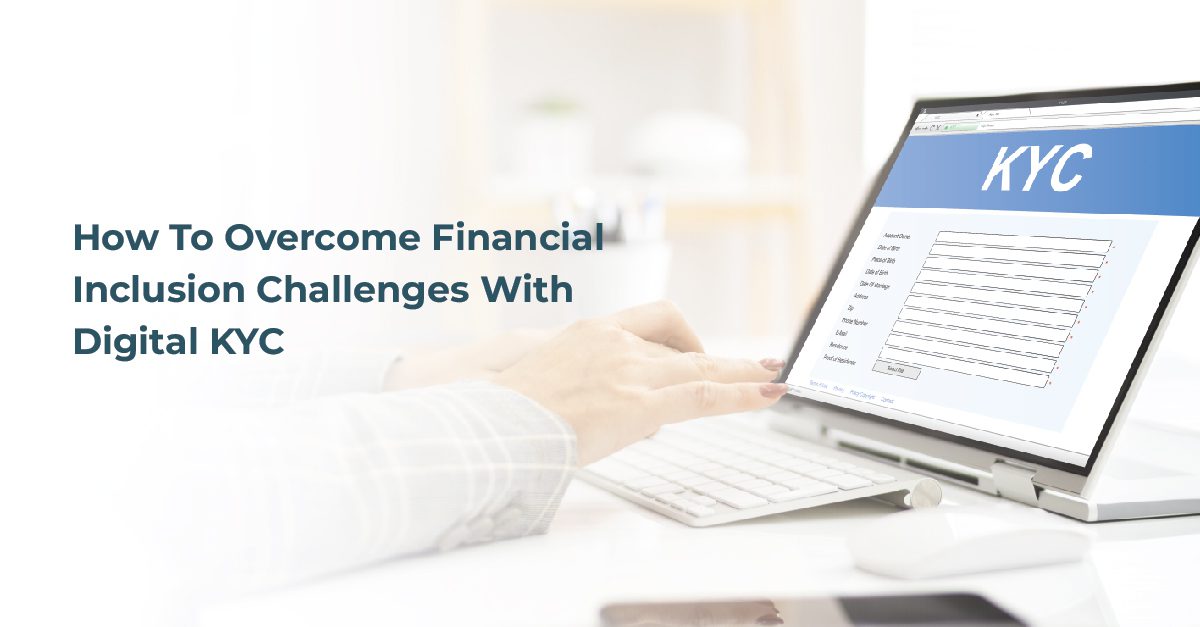India’s economy broadly comprises formal & informal sectors, of which the latter makes up about half of the country’s GDP. The informal economy is heavily unorganized & includes people like daily wage earners, domestic workers, migrant workers, & street vendors, among others.
In recent years, financial services in India have undergone a transformation, fueled by technology enablers and supported by the government and regulators such as the RBI. However, the informal economy can only transition to the formal economy if it is relieved of the burden of regulatory compliance and given access to modern, digitized systems.
A recent report outlining the financial inclusion challenges suggests that using a document-heavy approach with a population that already struggles with low financial literacy is counterproductive when the country is working on improving inclusion across economies.
This implies that KYC verification should be simplified, particularly for low-income groups and the elderly, where there are fewer AML concerns. This encourages ease of access to financial services for a large chunk of the people in the informal economy.
Challenges Due to KYC Compulsion
Making KYC mandatory for several cases creates obstacles for people in many instances. These barriers make it difficult for a large chunk of the population to access financial services & hence come in the way of financial inclusivity.
1) KYC Requirement For Accessing Advisory Financial Services
Financial advisory services by professionals offer advice on ways to manage finances & assets effectively. Requiring KYC verification for accessing advisory services often becomes an obstacle when financial inclusion is considered.
As per SEBI’s regulations investment advisors are required to collect PAN data of individuals seeking financial advice for the purpose of performing KYC. This direction poses a challenge for low-income individuals, especially those in the informal economy as they mostly do not possess PAN cards.
The criteria of the PAN requirement presents a challenge for financial inclusion when one wants to avail of financial assistance & advice.
2) Multiple KYC Requirement
Each time an individual wants to access various financial products or services, he or she is required to undergo the same KYC process again. The repetitive need for going through KYC checks creates a hurdle when one wants to access several services or products.
Though the customer is accessing these services through their KYC-verified bank account which is meeting all the necessary compliance requirements, having to undergo KYC checks multiple times becomes an obstacle when the country’s economy is working towards diversifying financial inclusion.
3) PAN-Exempt KYC
PAN exemptions are available for investments of up to INR 50,000 per year; however, these investments require KYC. PAN-exempt KYC verification requires either OTP or biometric verification, both of which have several shortcomings.
Moreover, OTP-based KYC is not regarded as full KYC which requires individuals to undergo verification via video call. The video call-based verification again introduces several challenges that hinder financial inclusion.
Financial Inclusion Challenges in KYC Verification
Nearly all the available KYC variants present their own challenges to financial inclusion. Aadhaar KYC, biometric verification & the recently introduced Video KYC process offer streamlined and convenient workflows for onboarding clients but ultimately do not address the larger problems.
OTP-Based KYC:
A large proportion of people in urban, semi-urban, and rural areas, especially the elderly population in India do not have their mobile numbers linked to their Aadhaar cards. This is due to the fact that updating the mobile number necessitates an in-person visit to an Aadhaar center.
These individuals typically fail to complete the process of linking their mobile numbers to their Aadhaar documents, rendering them unable to complete KYC via the Aadhaar OTP authentication method.
Biometric KYC:
In comparison to an OTP-based KYC, the biometric alternative also comes with a unique set of challenges. The availability of biometric scanners is far more limited, transferring biometrics for verification & unreliable network availability add to the obstacles that this method of KYC faces.
Adding to these challenges is the fact that biometrics, especially fingerprints are not fully reliable. This is because in some cases such as those of the fingerprints of manual laborers can be inaccurate due to bruises & cuts.
Video-Based KYC:
Video KYC through a real-time video call between a customer & bank staff encounters many challenges too.
Individuals living in remote locations face network difficulties when attempting to connect to the video call. Validation is performed against IDs that may be very old (which have old photographs), making verification even more difficult to complete in areas with network issues.
The challenge is exacerbated by the limited availability of bank officials, particularly outside of business hours, which is when the majority of the target population is available for KYC. Individuals are forced to complete KYC manually which is both burdensome & time-consuming.
How To Overcome These Challenges & Facilitate Financial Inclusion?
To achieve better financial inclusion across the economy of India, it is important that the problems posed by KYC are taken into account & solved effectively.
- Given that the PAN-Aadhaar linkage is nearing completion, the requirement to verify KYC through a PAN card for accessing financial advisory services is obsolete.
Also, advice is not the same as a financial transaction & hence will not raise any AML or tax evasion concerns on its own. Thus, customers must be allowed to access these services either without a second KYC or by completing a simple KYC check.
- To simplify transactions & accessibility to financial services, there should be a single KYC for all products & services linked to a bank account. The customer should only have to undergo KYC verification once & be able to access various services & perform transactions through the same account.
However, if the volume of transactions for a specific customer exceeds a certain threshold, the RBI can order a more thorough verification, i.e., a second level of KYC to mitigate risks.
- Financial institutions should provide their customers with the option to update mobile numbers linked to their Aadhaar at all biometric authentication points. This step greatly aids in mitigating the vast number of mobile number mismatches across the country.
In addition, when an individual purchases a new SIM card, the option to update the mobile number should be provided. This is necessary especially since Aadhaar is used as the ID proof for obtaining a new SIM.
Further, an OTP-based KYC should be considered full KYC, & allow customers to begin transacting faster.
- Instead of conducting KYC checks in-person or via live video call, FIs & regulatory bodies should allow the usage of remote KYC verification systems. Digital KYC enables an effective, seamless & robust means of conducting customer verification as it is equipped with smart technologies like liveness checks, geotagging & assisted modes of verification.
Digital KYC Is Key To Improving Financial Inclusion In India
India’s informal economy is made up of unregistered businesses that do not provide employees with social security. This state of the economy hinders the country’s progress, especially toward that of financial inclusion.
Although informality has declined in the past few years, it is happening at a snail’s pace, resulting in several problems of inaccessibility that lead to the increase of issues like poverty & unemployment.
Digital KYC acts as a smart, easy & effective solution to these challenges by enabling customer verification digitally. Platforms like SignDesk provide an AI-enabled digital KYC workflow that can help businesses create a seamless verification journey for their clients & customers. Digital KYC helps authenticate individuals in real-time, & allows them to make financial transactions & access the services they need much faster & more conveniently.
Digitizing the entire KYC process also helps unbanked customers take their first steps toward financial inclusion. It removes any entry barriers to formal financial services, such as in-person or biometric-based verification which are mostly inconvenient, unreliable & difficult to achieve.
Digital KYC aids the formalization of India’s economy which will present improved productivity & increasing the country’s ability to compete and thrive in the global economy. On automation platforms like SignDesk, businesses can completely digitize verification & KYC journeys, have their documents digitized & automate contract management from end-to-end, & integrated eSign & eStamp software to expedite document workflows to completely transform the way they manage their KYC & documentation processes.

































